(完整版)一般现在时概念及习题(可编辑修改word版)
一般现在时态讲解及练习(精简版,错题版).doc
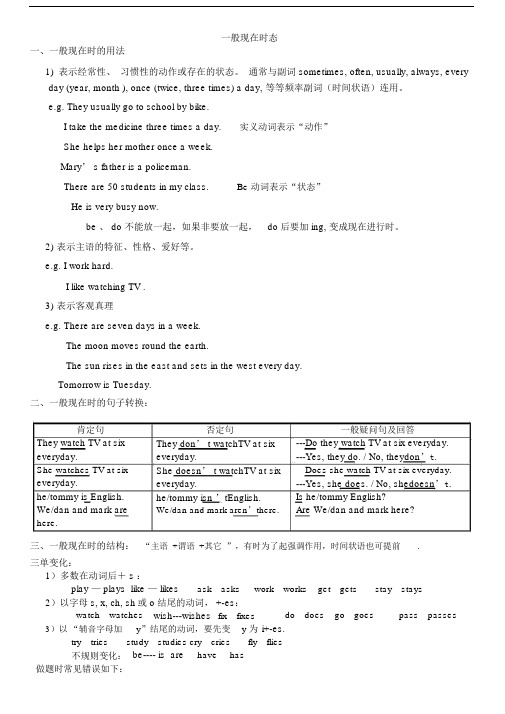
一般现在时态一、一般现在时的用法1)表示经常性、习惯性的动作或存在的状态。
通常与副词 sometimes, often, usually, always, everyday (year, month ), once (twice, three times) a day, 等等频率副词(时间状语)连用。
e.g. They usually go to school by bike.I take the medicine three times a day.实义动词表示“动作”She helps her mother once a week.Mary’ s father is a policeman.There are 50 students in my class.Be 动词表示“状态”He is very busy now.be 、 do 不能放一起,如果非要放一起,do 后要加 ing, 变成现在进行时。
2) 表示主语的特征、性格、爱好等。
e.g. I work hard.I like watching TV .3) 表示客观真理e.g. There are seven days in a week.The moon moves round the earth.The sun rises in the east and sets in the west every day.Tomorrow is Tuesday.二、一般现在时的句子转换:肯定句否定句一般疑问句及回答They watch TV at six everyday.She watches TV at six everyday.he/tommy is English. We/dan and mark are They don’ t watchTV at sixeveryday.She doesn’ t watchTV at sixeveryday.he/tommy isn ’tEnglish.We/dan and mark aren’there.---Do they watch TV at six everyday.---Yes, they do. / No, theydon’t.---Does she watch TV at six everyday.---Yes, she does. / No, shedoesn’t.Is he/tommy English?Are We/dan and mark here?here.三、一般现在时的结构:“主语+谓语+其它”,有时为了起强调作用,时间状语也可提前.三单变化:1)多数在动词后+ s :play — plays like — likes ask---asks2)以字母 s, x, ch, sh或 o 结尾的动词, +-es:work---works get---gets stay---stays watch---watches wish---wishes fix---fixes do---does go---goes pass---passes 3)以“辅音字母加- y”结尾的动词,要先变y 为i+-es.try---tries study---studies cry---cries fly---flies不规则变化:be---- is are have----has做题时常见错误如下:1)、be 动词与行为动词同时出现在句子中例: We are plant(plant) the trees in spring.答案: plant2)、单三人称形式易出错例: 1 He plaies (play) football very well.2 Danny gos (go) to school at 7:10.答案: 1 plays 2 goeses;解析: 1 以辅音字母加y 结尾的动词变单三人称形式才能把y 换成 i 再加2 与名词变复数不同,变单三人称形式以o 结尾的词要加 es.3)、在句式变换时易出错例: 1 Does Jenny has (has) a good friend?2 Brian doesn’ t lives (not live) in China.答案: 1 Does have 2 doesn ’t live解析:口诀:“见助动,用原形”。
(完整版)一般现在时练习题及答案解析

一、一般现在时填空题1.Jim’s cups ________ (be) blue and white.【答案】are【解析】【分析】【详解】句意:吉姆的杯子是蓝白相间的。
句子为一般现在时。
根据主语“Jim’s cups”为复数形式,故be动词应该是are。
故填are。
2.My family ________ (not do) the housework at the weekend.【答案】don’t do【解析】【详解】句意:我的家人在周末不做家务。
根据后面的“at the weekend”可知,时态是一般现在时,由语境可知,此处family表示“家人”,是集合名词,谓语动词用复数,do是实义动词,所以否定句要用助动词don’t,后面接动词原形do,故填don’t do。
3.Her mother ________ (not watch) TV every evening.【答案】doesn’t watch【解析】【详解】句意:她妈妈每晚不看电视。
根据时间状语“every evening”可知,时态为一般现在时;主语为“Her mother”,变否定句要用助动词doe sn’t,助动词后接动词原形。
故填doesn’t watch。
4.I often ________(go)to school by bike.【答案】go【解析】【详解】句意:我经常骑自行车去上学。
根据“often”可知,时态是一般现在时,主语是I,所以用动词原形go“去”,故填go。
5.My mother always __________ (cook) breakfast at six o’ clock in the morning.【答案】cooks【解析】【详解】句意:我的妈妈总是在早上六点做早饭。
cook做饭,是一个动词。
根据句意和句中的always…at six o’clock in the morning可知,这里表示经常性的动作,应用一般现在时,主语My mother是第三人称单数,故谓语动词应变为cooks。
(完整word版)一般现在时概念及习题

一般现在时概念:一般现在时一般用来表示人或物经常性或习惯性的动作或状态,也可以用来表示人或物现在的状态或者用来表示主语现在具有的性格或能力等。
1、表示经常的或者习惯性的动作,常与表示频度的时间状语连用。
时间状语:every morning,every night,every evening,every day/week/year, twice a week, once a month,频度副词:always, usually, often, sometimes, seldom, never.例句:Tom is always late for school.What time do you usually get up every day?2、表示主语具备的性格、能力和特征。
例句:Wang Li writes good English but does not speak well.3、表示现在的状态。
例句: The earth moves around the sun.Shanghai is in the east of China.变化形式:1. 主语不是第三人称单数时,助动词为do:1) 肯定句:主语+动词原形+其他We have six classes every day.2) 否定句:主语+ don't + 动词原形+其他We don’t have six classes eve ry day.3) 一般疑问句:Do+主语+动词原形+其他---Do you have six classes every day?---Yes, I do. / No, I don’t.4) 特殊疑问句:疑问词+以do开头的一般疑问句What classes do you have every day?2. 主语为第三人称单数时,助动词为does:1) 肯定句:主语+动词三单式(+其它)。
He swims well.变化形式:2) 否定句:主语+ doesn’t + 动词原形(+其它)He doesn’t swim well..3) 一般疑问句:Does +主语+动词原形+其它---Does he swim well ?---Yes, he does. / No, he doesn't.4) 特殊疑问句:疑问词+以does开头的一般疑问句How does your father go to work?练习一、写出下列动词的第三人称单数talk______forget______hope______stop______play______say______buy______worry______fly______study_______like_______make______love_______become_______come_______drive_______shine_______leave_____wake_______ride_______write_______give______see______plan______get_______sit_______let_______swim______watch_______cut_______run_______forget_______begin_______wash_____do_____finish______teach_____fish_______reach_______go_______二、用括号内动词的适当形式填空。
(完整word版)行为动词的一般现在时语法及相应练习
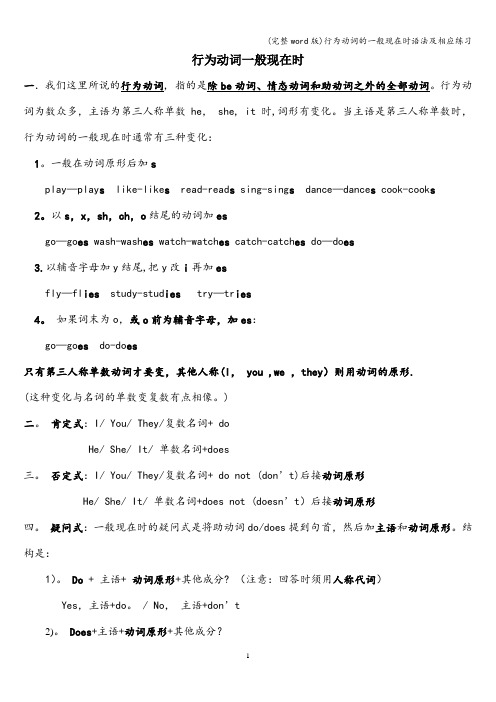
行为动词一般现在时一.我们这里所说的行为动词, 指的是除be动词、情态动词和助动词之外的全部动词。
行为动词为数众多,主语为第三人称单数he, she, it时,词形有变化。
当主语是第三人称单数时,行为动词的一般现在时通常有三种变化:1。
一般在动词原形后加splay—play s like-like s read-read s sing-sing s dance—dance s cook-cook s2。
以s,x,sh,ch,o结尾的动词加esgo—go es wash-wash es watch-watch es catch-catch es do—do es3.以辅音字母加y结尾,把y改i再加esfly—fl ies study-stud ies try—tr ies4。
如果词末为o,或o前为辅音字母,加es:go—go es do-do es只有第三人称单数动词才要变,其他人称(I, you ,we ,they)则用动词的原形.(这种变化与名词的单数变复数有点相像。
)二。
肯定式:I/ You/ They/复数名词+ doHe/ She/ It/ 单数名词+does三。
否定式:I/ You/ They/复数名词+ do not (don’t)后接动词原形He/ She/ It/ 单数名词+does not (doesn’t)后接动词原形四。
疑问式:一般现在时的疑问式是将助动词do/does提到句首,然后加主语和动词原形。
结构是:1)。
Do + 主语+ 动词原形+其他成分? (注意:回答时须用人称代词)Yes,主语+do。
/ No,主语+don’t2)。
Does+主语+动词原形+其他成分?Yes,主语+does。
/ No, 主语+doesn’t.(注意:回答时须用人称代词)五. 那么,什么情况下用行为动词的一般现在时呢?当这个动作经常发生或表示习惯性的动作时,通常用一般现在时,它经常与表示频度的时间状语连用,如,当句子中有every day every year ,on Sunday, in the morning ,often, sometimes,usually, at one o’clock等词时,用一般现在时。
一般现在时知识点梳理及经典练习(超详细)(word)
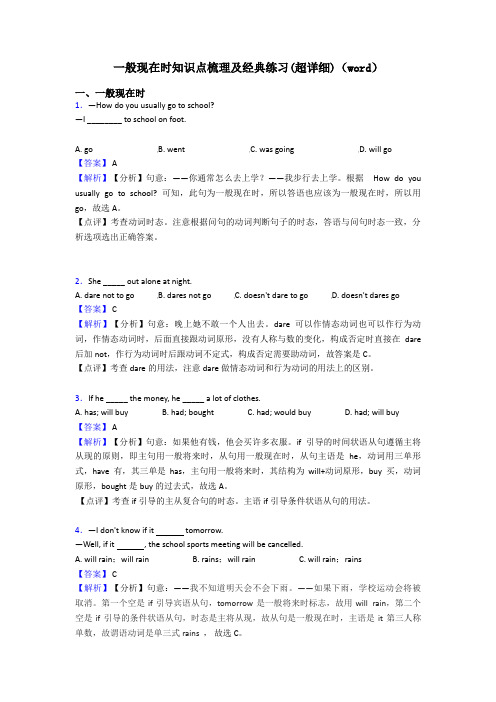
一般现在时知识点梳理及经典练习(超详细)(word)一、一般现在时1.—How do you usually go to school?—I ________ to school on foot.A. goB. wentC. was goingD. will go【答案】 A【解析】【分析】句意:——你通常怎么去上学?——我步行去上学。
根据How do you usually go to school? 可知,此句为一般现在时,所以答语也应该为一般现在时,所以用go,故选A。
【点评】考查动词时态。
注意根据问句的动词判断句子的时态,答语与问句时态一致,分析选项选出正确答案。
2.She _____ out alone at night.A. dare not to goB. dares not goC. doesn't dare to goD. doesn't dares go【答案】 C【解析】【分析】句意:晚上她不敢一个人出去。
dare可以作情态动词也可以作行为动词,作情态动词时,后面直接跟动词原形,没有人称与数的变化,构成否定时直接在dare 后加not,作行为动词时后跟动词不定式,构成否定需要助动词,故答案是C。
【点评】考查dare的用法,注意dare做情态动词和行为动词的用法上的区别。
3.If he _____ the money, he _____ a lot of clothes.A. has; will buyB. had; boughtC. had; would buyD. had; will buy【答案】 A【解析】【分析】句意:如果他有钱,他会买许多衣服。
if引导的时间状语从句遵循主将从现的原则,即主句用一般将来时,从句用一般现在时,从句主语是he,动词用三单形式,have有,其三单是has,主句用一般将来时,其结构为will+动词原形,buy买,动词原形,bought是buy的过去式,故选A。
(完整版)一般现在时讲解+练习
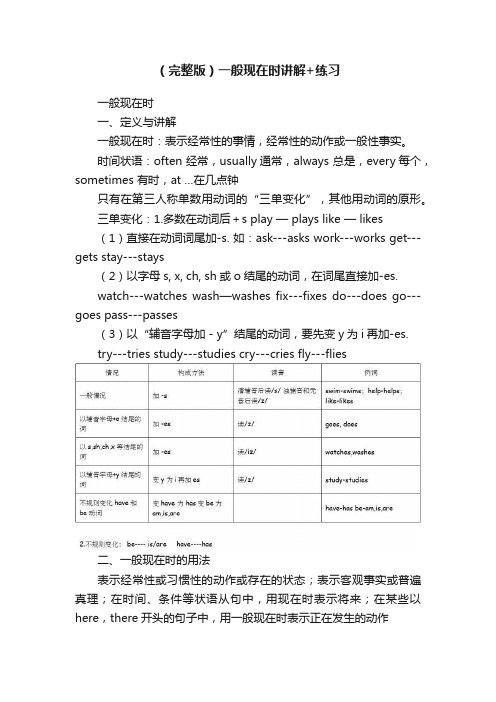
(完整版)一般现在时讲解+练习一般现在时一、定义与讲解一般现在时:表示经常性的事情,经常性的动作或一般性事实。
时间状语:often 经常,usually通常,always 总是,every每个,sometimes 有时,at …在几点钟只有在第三人称单数用动词的“三单变化”,其他用动词的原形。
三单变化:1.多数在动词后+s play — plays like — likes(1)直接在动词词尾加-s. 如:ask---asks work---works get---gets stay---stays(2)以字母s, x, ch, sh或o结尾的动词,在词尾直接加-es.watch---watches wash—washes fix---fixes do---does go---goes pass---passes(3)以“辅音字母加 - y”结尾的动词,要先变y为i再加-es.try---tries study---studies cry---cries fly---flies二、一般现在时的用法表示经常性或习惯性的动作或存在的状态;表示客观事实或普遍真理;在时间、条件等状语从句中,用现在时表示将来;在某些以here,there开头的句子中,用一般现在时表示正在发生的动作当主语是第三人称单数时:1、动词变相应的第三人称单数形式2、肯定句主语+动词s+其它3、否定句主语+doesn't+动词原形+其它4、一般疑问句Does+主语+动词原形+其它5、肯定回答 Yes,主语+does6、否定回答 No,主语+doesn't7、特殊疑问句特殊疑问词+一般疑问句当主语不是第三人称单数时:1、肯定句主语+动词原形+其它2、否定句主语+don't+动词原形+其它3、一般疑问句 Do+主语+动词原形+其它4、要注意,句式结构错则全都错。
5、谓语动词的形式:do/does一般现在时练习一、用所给词的正确形式填空1. We often ___________ (play) on the playground.2. He _________ (get) up at six o’clock.3. __________you _________ (brush) your teeth every morning.4. What____ (do) he usually _____ (do) after school?5. Danny _______ (study) English, Chinese, Math, Science and Art at school.6. Mike sometimes __________ (go) to the park with his sister.7. At eight at night, she ________ (watch) TV with his parents.8. ________ Mike________ (read) English every day?9. How many lessons ______your classmate____ (have) on Monday?10. What time ____his mother_________ (do) the housework?11. He often ______ (have) dinner at home. 12. Daniel and Tommy___ (be) in Class One. 13. We____ (not watch) TV on Monday. 14. Nick _____(not go) to the zoo on Sunday.15. They______ (like) the World Cup? 16. What ____they often ____ (do) on Saturdays17. Your parents________ (read) newspapers every day?18. The girl______ (teach) us English on Sundays.19. She and I _______ (take) a walk together every evening.20. There_______ (be) some water in the bottle. 21. Mike ______ (like) cooking.22. They_______ (have) the same hobby. 23. My aunt______ (look) after her baby carefully.24. You always____ (do) your homework well. 25. I_____ (be) ill. I’m sta ying in bed.26. She_____ (go) to school from Monday to Friday. 27. Liu Tao _____ (do) not like PE.28. The child often______ (watch) TV in the evening.29. Su Hai and Su Yang ______(have) eight lessons this term.30. -What day ______(be) it today? -It’s Saturday.31. Don’t make a noise. Grandpa __________ (sleep).32. Tom’s family__________ (watch) TV.33. It ________ (take) me two hours to finish my homework last night.34. What ______ your mother _______ (do) every evening? She_______ (wash) clothes.35. _______ it ______ (rain) every day?36. What _______ (do) you _______ on Sundays? We ________ (play) football.37. There ________ (be) a football match on TV every morning.38. They often ________ (visit) the Great Wall.39. Who _______ (dance) the best in your class?40. He _____________ (not come).41. The earth __________ (move) round the sun.42 She ________ (buy) a sweater.43. Mr. Wang often______ (go) to Shanghai.二、改句子1. Do you often play football after school? (肯定回答)_______________________________2. I have many books. (改为否定句)_______________________________3. Gao Shan's sister likes playing table tennis (改为否定句)________________________4. She lives in a small town near New York. (改为一般疑问句)________________________5. I watch TV every day. (改为一般疑问句)________________________6. David has a goal. (改为一般疑问句)________________________7. We have four lessons.(否定句)________________________8. Nancy doesn’t run fast (肯定句)________________________9. My dog runs fast. (一般疑问句) ________________________(把10—14小题变否定句,一般疑问句和划线提问)10. Mike has two letters for him. ________________________11. I usually play football on Friday afternoon.________________________12. Su Yang usually washes some clothes on Saturday. ________________________13. Mingming usually waters the flowers every day. ________________________14. Tom does his homework at home. ________________________三、写出下列动词的第三人称单数形式:1. wash_________ match _______ guess______ study______finish_________ go________ snow______ carry_________2. stop______ see________ drive ________let_______ carry______keep_____ join______ find_______ think________ teach______ catch______3. stay_______ begin______ forget_______ lie________ die _______run_______ prefer______ give________ ring_______ dance______ hope_______四、单项选择:1. There _____ an English film at the cinema now.A. will haveB. is going to haveC. is going to beD. is2. The picture _______ nice. A. looks B. is looked C. look D. is looking3. She ______ down and soon falls asleep. A. live B. lain C. laidD. sits4. They _____ the office in time very morning. A. reach to B. arrived C. went D. get to5. We shall go to Shanghai on business before you _____ back next week.A. will comeB. cameC. would comeD. come6. The plane ______ over there. A. is B. are C.am D. was7. I see her ____ the room this morning. A. to enter B. enteredC. enterD. enters8. The teacher ________us to come to school on time. A. ask B. asking C. asks D. asked9. John always ______ others. A. help B. helping C. helps D. to help10. He ______for eight hours every day. A. working B. to workC. worksD. worked11. You’d better ______ at home and ______ your homework.A. to stay, doB. stay, doC. to stay, to doD. stay, to do12. He sits down and ______ a rest. A. having B. have C. to haveD. has13. Uncle Wang never ______ a cake. A. make B. to make C. making D. makes五、请写出下列句子1.他每天早上七点乘公交车去上学。
一般现在时知识点总结及经典习题(含答案)(word)(1)

一般现在时知识点总结及经典习题(含答案)(word)(1)一、一般现在时1.Before the sun ______, we need to get to the top of the mountain.A. setB. setsC. is settingD. will set【答案】B【解析】【分析】句意:在太阳落山之前,我们需要到达山顶。
主句是将来时,在时间和条件状语从句中要用一般现在时。
从句的主语“the sun” 是第三人称单数,所以set用三单形式,故答案选B。
【点评】本题考查在时间状语从句中动词的时态原则:用-般现在时代替一般将来时。
2.She always keeps a balanced diet. It _____ different kinds of foods.A. includeB. includesC. includingD. included【答案】 B【解析】【分析】句意:她总是保持均衡饮食。
均衡饮食包括不同种类的食物。
include在句中作谓语,故排除非谓语形式including,根据She always keeps a balanced diet.可知句子时态为一般现在时,主语It是第三人称单数,谓语动词使用单三形式,故答案是B。
【点评】考查一般现在时,注意一般现在时单三形式在具体语境中的运用。
3.She _____ out alone at night.A. dare not to goB. dares not goC. doesn't dare to goD. doesn't dares go【答案】 C【解析】【分析】句意:晚上她不敢一个人出去。
dare可以作情态动词也可以作行为动词,作情态动词时,后面直接跟动词原形,没有人称与数的变化,构成否定时直接在dare 后加not,作行为动词时后跟动词不定式,构成否定需要助动词,故答案是C。
【点评】考查dare的用法,注意dare做情态动词和行为动词的用法上的区别。
一般现在时讲解及练习(精编文档).doc
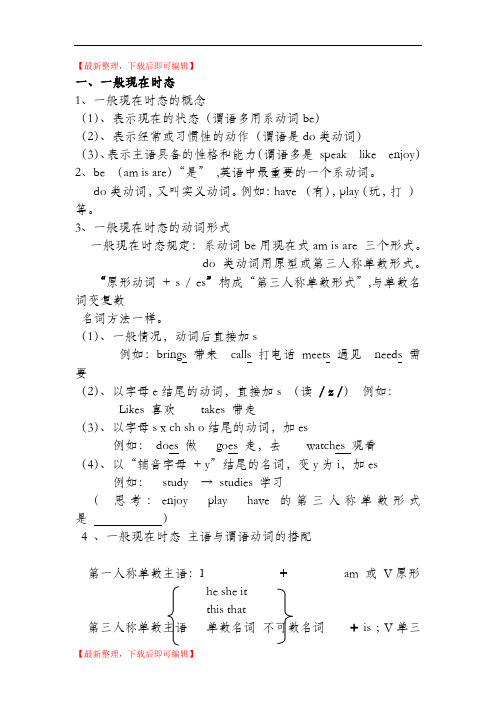
【最新整理,下载后即可编辑】一、一般现在时态1、一般现在时态的概念(1)、表示现在的状态(谓语多用系动词be)(2)、表示经常或习惯性的动作(谓语是do类动词)(3)、表示主语具备的性格和能力(谓语多是speak like enjoy)2、be (am is are)“是”,英语中最重要的一个系动词。
do类动词,又叫实义动词。
例如:have (有),play(玩,打)等。
3、一般现在时态的动词形式一般现在时态规定:系动词be用现在式am is are 三个形式。
do 类动词用原型或第三人称单数形式。
“原形动词+ s / es”构成“第三人称单数形式”,与单数名词变复数名词方法一样。
(1)、一般情况,动词后直接加s例如:brings 带来calls 打电话meets 遇见needs 需要(2)、以字母e结尾的动词,直接加s (读/ z /)例如:Likes 喜欢takes 带走(3)、以字母s x ch sh o结尾的动词,加es例如:does 做goes 走,去watches 观看(4)、以“辅音字母+ y”结尾的名词,变y为i,加es 例如:study →studies 学习(思考:enjoy play have的第三人称单数形式是)4 、一般现在时态主语与谓语动词的搭配第一人称单数主语:I +am 或V原形he she itthis that第三人称单数主语单数名词不可数名词+is ; V单三形式动词不定式动名词We you they复数主语these those + are ; V原形复数名词本块习题:用所给词的正确形式填空1、I _______ ( have ) a soccer ball .2、She ______ ( have ) two __________ ( pingpong—ball ) .3、He ______ ( play ) sports every day .4、We ______ ( speak ) English .5、Tom ______ ( call ) Jim every day .6、My daughter ______ ( like ) apples .7、His ______ ( friend ) knows English .8、The girl ______ ( study ) English sometimes .9、The _______ ( boy ) often watch TV .10、Her uncle ______ ( go ) home on foot 。
- 1、下载文档前请自行甄别文档内容的完整性,平台不提供额外的编辑、内容补充、找答案等附加服务。
- 2、"仅部分预览"的文档,不可在线预览部分如存在完整性等问题,可反馈申请退款(可完整预览的文档不适用该条件!)。
- 3、如文档侵犯您的权益,请联系客服反馈,我们会尽快为您处理(人工客服工作时间:9:00-18:30)。
一般现在时
概念:一般现在时一般用来表示人或物经常性或习惯性的动作或状态,也可以用来表示人或物现在的状态或者用来表示主语现在具有的性格
或能力等。
1、表示经常的或者习惯性的动作,常与表示频度的时间状语连用。
时间状语:every morning,every night,every evening,every day/week/year, twice a week, once a month,
频度副词:always, usually, often, sometimes, seldom, never.
例句:Tom is always late for school.
What time do you usually get up every day?
2、表示主语具备的性格、能力和特征。
例句:Wang Li writes good English but does not speak well.
3、表示现在的状态。
例句: The earth moves around the sun.
Shanghai is in the east of China.
变化形式:1. 主语不是第三人称单数时,助动词为do:
1)肯定句:主语+动词原形+其他
We have six classes every day.
2)否定句:主语+ don't + 动词原形+其他
We don’t have six classes every day.
3)一般疑问句:Do+主语+动词原形+其他
---Do you have six classes every day?
---Yes, I do. / No, I don’t.
4)特殊疑问句:疑问词+以do 开头的一般疑问句
What classes do you have every day?
2.主语为第三人称单数时,助动词为does:
1)肯定句:主语+动词三单式(+其它)。
He swims well.
变化形式:2) 否定句:主语+ doesn’t + 动词原形(+其它)
He doesn’t swim well..
3)一般疑问句:Does +主语+动词原形+其它
---Does he swim well ?
---Yes, he does. / No, he doesn't.
4)特殊疑问句:疑问词+以does 开头的一般疑问句
How does your father go to work?
练习
一、写出下列动词的第三人称单数
talk forget hope stop play say
buy worry fly study like make
love become come drive shine
leave wake ride write give see
plan get sit let swim watch
cut run forget begin wash do finish teach fish reach go
二、用括号内动词的适当形式填空。
1.He often (have) dinner at home.
2.Daniel and Tommy (be) in Class One.
3.We (not watch) TV on Monday.
4.Nick (not go) to the zoo on Sunday.
5.they (like) the World Cup?
6.What they often (do) on Saturdays?
7.your parents (read) newspapers every day?
8.The girl (teach) us English on Sundays.
9.There (be) some water in the bottle.
10.Mike (like) cooking.
三、按照要求改写句子
1.Daniel watches TV every evening.(改为否定句)
2.I do my homework every day.(改为一般疑问句,并作否定回答)
3.She likes milk.(改为一般疑问句,并作肯定回答)
4.Amy likes playing computer games.(改为一般疑问句,并作否定回答)
5.We go to school every morning.(改为否定句)
6.He speaks English very well.(改为否定句)
7.John comes from Canada.(对划线部分提问)
8.She is always a good student.(改为一般疑问句,作否定回答)
9.Do you often play football after school? (肯定回答)
10.I have many books. (改为否定句)
11.We have four lessons.(改为否定句)
12.Nancy doesn't run fast. (改为肯定句)
13.My dog runs fast. 否定句:
14.Mike has two letters for him.一般疑问句:_
15.I usually play football on Friday afternoon.
一般疑问句:
划线提问
16.Sun Yang usually washes some clothes on Saturday.
一般疑问句:
否定句:
划线提问:
17.Sally usually waters the flowers every day.
一般疑问句:
否定句:
划线提问
18.Tom does his homework at home.
一般疑问句:
否定句:
划线提问
四.选择
( ) 1. you have a book?
A. Do
B. Are
C. Is
D. Have
( )2. They on a farm.
A. working
B. is work
C. work
D. is worked
( ) 3. Does Peter like to watch TV?
.
A. Yes, he like
B. No, he doesn’t
C. Yes, he’d like
D. No, he likes ( )4. She doesn’t her homework in the afternoon.
A. doing
B. to do
C. does
D. do
( )5. How Mr. Brown to America?
A. do,go
B. is,go
C. does,go
D. does,goes
( )6. How he go to work?
He to work by bike.
A. does ;go
B. do;goes
C. do ;go
D. does;goes
( )7. you usually late for school?
No, .
A. Do ; I am
B. Does ;not
C. Are ; I’m not
D. Are ; I aren’t ( )8. she home at six every day?
A. Is , leave
B. Does , leave
C. Is , leaves
D. Does , left ( )9. Mr. Yang English this term.
A. teaches our
B. teaches us
C. teachs us
D. teach our。
